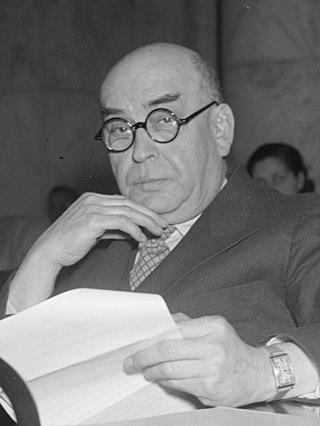Related Research Articles
Chris Argyris was an American business theorist and professor at Yale School of Management and Harvard Business School. Argyris, like Richard Beckhard, Edgar Schein and Warren Bennis, is known as a co-founder of organization development, and known for seminal work on learning organizations.
Reviewing request.

Organizational theory refers to a series of interrelated concepts that involve the sociological study of the structures and operations of formal social organizations. Organizational theory also seeks to explain how interrelated units of organization either connect or do not connect with each other. Organizational theory also concerns understanding how groups of individuals behave, which may differ from the behavior of an individual. The behavior organizational theory often focuses on is goal-directed. Organizational theory covers both intra-organizational and inter-organizational fields of study.
Organizational behavior or organisational behaviour is the: "study of human behavior in organizational settings, the interface between human behavior and the organization, and the organization itself". Organizational behavioral research can be categorized in at least three ways:
A contingency theory is an organizational theory that claims that there is no best way to organize a corporation, to lead a company, or to make decisions. Instead, the optimal course of action is contingent (dependent) upon the internal and external situation. Contingent leaders are flexible in choosing and adapting to succinct strategies to suit change in situation at a particular period in time in the running of the organization.

Rakesh Khurana is an Indian-American educator. He is a Professor of Sociology at Harvard University, Professor of Leadership Development at Harvard Business School and the Dean of Harvard College.
Fritz Jules Roethlisberger was a social scientist and management theorist at the Harvard Business School.
Jeffrey Pfeffer is an American business theorist and the Thomas D. Dee II Professor of Organizational Behavior at the Graduate School of Business, Stanford University, and is considered one of today's most influential management thinkers.
The history of contingency theories of leadership goes back over more than 100 years, with foundational ideas rooted in the mechanical thought of Taylorism. Later, management science began to recognize the influence of sometimes irrational human perceptions on worker performance. This led to taxonomies of leadership behavior and to contingency theories to adapt leadership behavior to the situation.
Stewart Clegg is a British-born Australian sociologist and organizational theorist, and a professor at the School of Project Management, University of Sydney. Prior to joining the University of Sydney he was Distinguished Professor of Management and Organization Studies at the University of Technology Sydney.
The Excellence theory is a general theory of public relations that “specifies how public relations makes organizations more effective, how it is organized and managed when it contributes most to organizational effectiveness, the conditions in organizations and their environments that make organizations more effective, and how the monetary value of public relations can be determined”. The excellence theory resulted from a study about the best practice in public relations, which was headed by James E. Grunig and funded by the Foundation of the International Association of Business Communicators (IABC) in 1985. Constructed upon a number of middle-range theories, and tested with surveys and interviews of professionals and CEOs in the United States, the United Kingdom, Canada, and South Korea, the Excellence theory provides a “theoretical and empirical benchmark” for public relations units.
Gene Wray Dalton (1928–1997) was a professor of organizational behavior at Harvard Business School and later at Brigham Young University (BYU).
Daniel A. (Dan) Wren is an American business theorist and Emeritus Professor at the University of Oklahoma, especially known for his 1972 book coauthored with Arthur G. Bedeian, entitled "The evolution of management thought."
Louis Truitt Wells, Jr. is an American academic, consultant and the Herbert F. Johnson Professor of International Management, Emeritis, at the Harvard Business School. He is known for his work on management of multinational corporations, the economic environment in which they operate, and their relations with governments of developing countries..
Paul Roger Lawrence was an American sociologist, Professor of Organizational Behavior at the Harvard Business School, and consultant, known from his work with Jay W. Lorsch on "Differentiation and integration in complex organizations."
Gerald R. (Jerry) Salancik was an American organizational theorist, and Professor at Carnegie Mellon University. He is best known for his work with Jeffrey Pfeffer on "organizational decision making" and "the external control of organizations."

Jay B. Barney is an American professor in strategic management at the University of Utah.

Louis Edward Kirstein was an American businessman and philanthropist. He was the chairman of Filene's, a Boston-based department store. He was "one of the foremost merchants and commercial leaders in New England," and "one of the outstanding leaders of American Jewry."
Mark Sheldon Mizruchi is the Robert Cooley Angell Collegiate Professor of Sociology and Barger Family Professor of Organizational Studies at the University of Michigan. He also holds an appointment as Professor of Management and Organizations at the University of Michigan Ross School of Business. His research has focused on the political activity of the U.S. corporate elite over the 20th and 21st centuries. He was influential in the development of social network analysis, and has published research in the fields of organizational theory, economic sociology, and political sociology.
References
- ↑ The John S. Bowman (1995) "Jay William Lorsch" in Cambridge Dictionary of American. Cambridge University Press.
- ↑ Jay W. Lorsch. Louis E. Kirstein Professor of Human Relations
- ↑ James I. Cash, Paul R. Lawrence, J. F. Nunamaker (1989) Harvard Business School Research Colloquium. p. 68